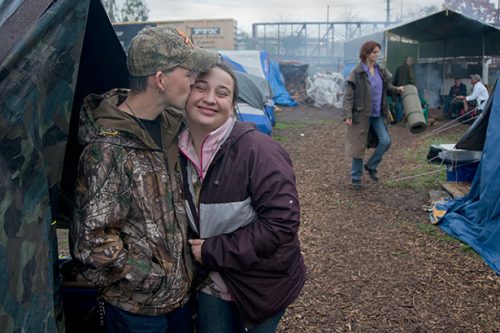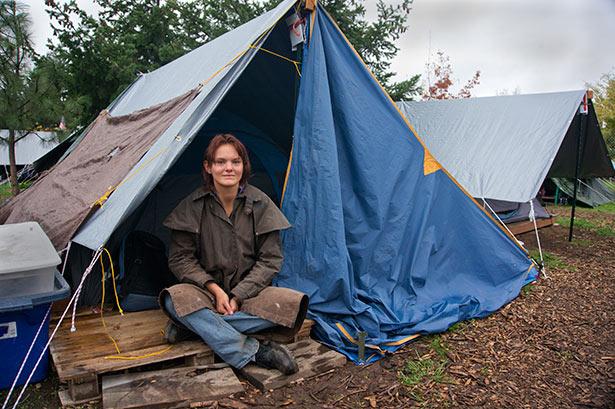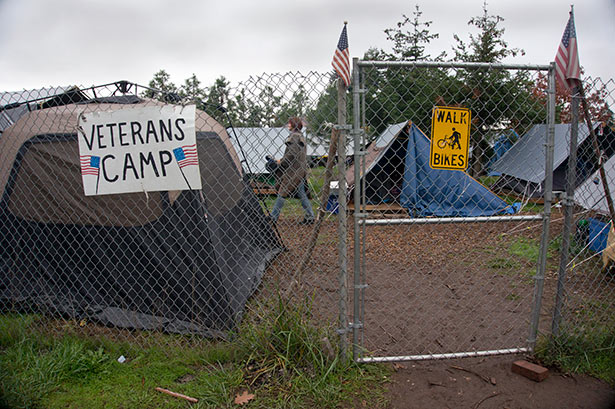
It’s 9 am on a Wednesday in November; a dozen people gather under an awning around a fire in a metal drum with a Union Pacific locomotive rumbling loudly in the background. They shuffle around to form something close to a circle to talk about how it’s going at the Eugene Safe Spot for veterans. This tent community, focused on helping homeless veterans get into housing, is nestled into a low-lying pie-slice of land just west of Chambers Street between the Northwest Expressway and the train tracks.
Jeremy Jordan, a 30-year-old who serves in the Army National Guard, has lived in the camp with his wife Rose Jordan, 23, for five months. They’d been homeless for four years, living in fields and under trees, when he first heard about the Eugene Safe Spot camps managed by Community Supported Shelters (CSS). “Being a guy,” he says, he was at first reluctant to ask for what seemed like charity to him. But Rose Jordan said, “enough is enough,” and they applied for and got a spot. He quickly became assistant on-site manager at the Vets Camps and also works in the CSS shop, and Rose Jordan works in the office. “It’s been fantastic,” Jeremy Jordan says.
The Vets Camp, which opened in March, has 15 platforms for tents. CSS has managed another similar-sized rest stop on city property on Roosevelt Boulevard since January. And plans are in the works to add a new 20-spot camp that would be a joint project between CSS and Veterans Affairs (VA) serving VA clients only.
The meeting around the fire, led by CSS Executive Director Erik de Buhr, starts with a roll call. Campers have a responsibility to communicate when they’re away from camp. One couple is not there and no one is quite sure why. There is concern and there will be follow-up. Three days away from camp without communication can lead to an eviction.
Jamie Kelso, 51, is on his second stint at the Vets Camp. During the summer, he had gone beyond the three-day limit to help a sick friend and came back to find his stuff all packed up. Some evicted campers try to come back; some don’t. Jamie, who served in the Army cavalry from 1985 to 1987 and suffers from post-traumatic stress disorder and a variety of disabling physical problems, was gone two months.
He’s been back about a week and is glad for his second chance — and understands the expectations more clearly. In the Vets Camp he doesn’t have to worry about other homeless people stealing his things, like he did when he lived on the banks of the Willamette River, and he can retreat to his tent when his anxiety in social situations kicks in. “Lot of vets are going through the same thing,” he says. “There’s a lot of understanding here.”
Comings and goings — and second chances — are an intrinsic part of the process at these camps. De Buhr tells the group that they’ve had 77 “documentable” people in the two camps. Of those, 26 have left because they found better housing situations, and 18 or 19 have been evicted.
Vincent Powers, 28, who’s been in the camp two months, says it’s encouraging to see people leave who have gone on to “a better place — people getting on their feet rather than getting in trouble.” And de Buhr says that not all the evicted people represent failure. “Sometimes it’s a blessing for individuals because they are forced to do something different with their lives,” he says.
 |
| Konnie Mack-Kilday. Photo by John Bauguess |
Konnie Mack-Kilday, 26, in the camp just 19 days, tells the camp circle, “My parents breathed more than a sigh of relief knowing that I’m here.” Mack-Kilday, who served with Jeremy Jordan in the National Guard, is the only single women in the camp. She’s a recovering addict who had been homeless three years, and had a “domestic dispute” with a man she’d been living with that led her to seek the safety of the camp. The other campers rallied around her, even extending the hours that someone was watching the gate into the camp to 24/7. She is already in training to join camp management and preparing to go into an outpatient treatment program.
De Buhr says that the Vets Camp is a “tougher crowd” than the other Safe Spot camp because of the military background of most of the campers and because more are chronically homeless. That’s why it’s important to make clear rules — like no drinking and drugs in camp — and enforce them. But that’s also why it’s important to have flexibility. There’s not a zero tolerance policy — except for violence — like at the Eugene Mission. It takes three “write-ups” before campers get evicted. “My first instinct is to try to help people,” de Buhr says.
And for the most part, it’s working, according to Bob Chambers, chaplain of Triple Cross Ministries, which set up tables and served lunch just outside the Vets Camp later that Wednesday. Chambers and others from his outreach motorcycle ministry have been helping at the camp since last spring, not only with food but also with donations such as mattresses and services such as helping one camper move into an apartment.
 |
| Entrance to the vets camp. Photo by John Bauguess |
Chambers says he sees a big difference from other encampments of homeless people they have served. “The great thing about the Vets Camp is that when we keep going back there we see things change,” Chambers says. “People don’t mind helping when you see people doing something to make themselves better.”
Wednesday’s lunch was preliminary to a group from the camp going out on their weekly community service project. On that day, they moved 20 cubic yards of wood chips into tree wells along the bike path near Eugene’s Owen Rose Garden. “I’m impressed,” says Lorna Baldwin, a volunteer coordinator for Eugene’s Parks and Open Spaces Division. “They are focused and hard-working. They see a task that needs to be done and they do it, which is delightful for me.”
The city is so supportive of the Vets Camp volunteers that staff members donated used rain gear to help keep them going through the wet months ahead. “I enjoy working with them so much,” Baldwin says. “I really love it.”
That’s a message that Jeremy Jordan, who is one of the volunteers moving all those wood chips on a beautiful November afternoon, would like more people to hear. “If people knew that we had a lot of people here that just need to be given an opportunity, we’d be able to prove that not all homeless people fit the bad stereotypes. Maybe we’re just down on our luck. We’re not looking for a handout, we’re just asking for that one thing that will lift us up and get us to where our next step is.”